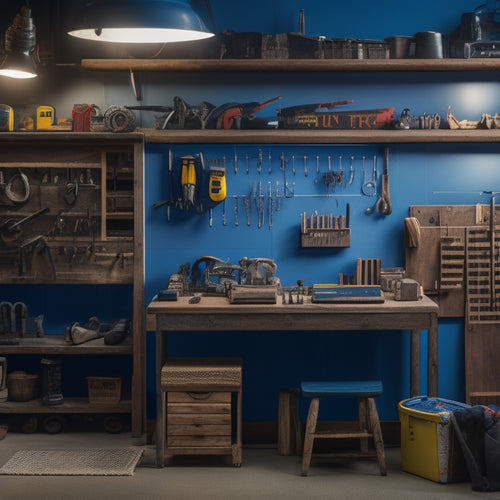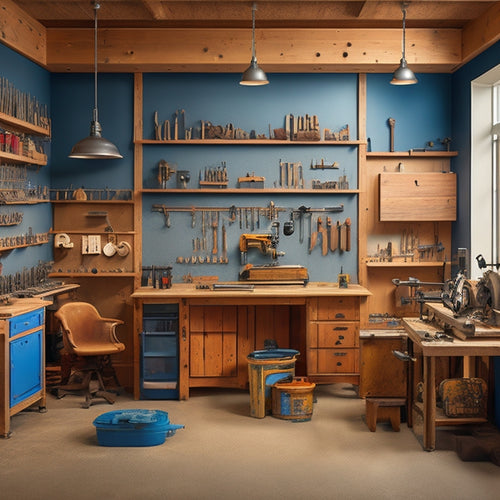
What Are the Best Concrete Trowels for Renovation
Share
You'll need a concrete trowel that can handle heavy use and deliver a smooth finish to bring your renovation project to life, and the best ones are those made from durable materials like high-carbon steel, stainless steel, or fiberglass. When choosing a trowel, look for features like precision control, material flexibility, and rust-resistant coatings. If you're working on walls, you'll need a trowel with a shorter handle and angled blade for better maneuverability. And for textured concrete, specialized notched or serrated blades are a must. By selecting the right trowel for your project, you'll be well on your way to achieving a flawless finish - and there's more to explore to guarantee your renovation turns out exactly as you envision.
Key Takeaways
• For renovation projects, high-carbon steel or stainless steel trowels are ideal for their flexibility and rigidity, ensuring smooth finishes.
• Durable materials and proper maintenance are crucial to prevent rust and corrosion, ensuring consistent performance.
• Trowel selection is critical, as the right tool can make or break the desired finish quality, especially for epoxy coatings and acidic materials.
• Unique demands of vertical surfaces require specialized wall trowels with shorter handles, angled blades, and non-slip grips for enhanced control and precision.
• Budget-friendly options can still deliver quality and functionality, with features like ergonomic handles, high-carbon steel blades, and well-balanced designs.
Top Rated Concrete Trowels
When it comes to achieving a smooth, even finish, you need a concrete trowel that can keep up with your demands. This is why we've compiled a list of top-rated concrete trowels that have earned their stripes in the renovation game. These trowels are built to last, with durable materials that can withstand the rigors of heavy use. You'll find trowels made from high-carbon steel, stainless steel, and even fiberglass, each with its own strengths and weaknesses.
When choosing the right trowel for your project, consider the type of finish you're aiming for and the surface you're working with. For example, a stainless steel trowel is ideal for applying epoxy coatings or working with acidic materials.
Regardless of the trowel material type you choose, proper maintenance is key to extending its lifespan. Make sure to clean your trowel regularly and store it in a dry place to prevent rust or corrosion.
Follow these trowel maintenance tips and you'll be rewarded with a tool that continues to deliver smooth, even finishes project after project.
Best Trowels for Smooth Finishes
You'll get the smoothest finishes with trowels that combine the right balance of flexibility and rigidity, allowing for precise control over your concrete application. When it comes to achieving a flawless finish, the right trowel can make all the difference.
For smooth finish techniques, you'll want to opt for a trowel made from high-carbon steel or stainless steel. These materials provide the perfect blend of flexibility and rigidity, allowing you to apply the perfect amount of pressure and control.
In comparison, trowels made from aluminum or magnesium can be too light and flexible, making it difficult to achieve a smooth finish. On the other hand, trowels made from heavy-duty materials like fiberglass can be too stiff, leading to unevenness and imperfections.
Concrete Finishing Tools for Walls
Moving from floors to walls, your concrete finishing tool arsenal needs to adapt to the unique demands of vertical surfaces, where control and precision are even more critical.
You'll need to focus on mastering wall trowel techniques that guarantee a smooth, even finish. For concrete wall finishing, you'll want to prioritize tools that offer superior grip, balance, and maneuverability.
When selecting a wall trowel, look for one with a shorter handle and a more compact, angled blade. This design allows for better control and precision when working on vertical surfaces. Additionally, consider a trowel with a non-slip grip to reduce fatigue and prevent accidents. A high-quality wall trowel will also feature a durable, rust-resistant blade that can withstand the demands of concrete finishing.
As you work on your concrete wall finishing project, remember to maintain a consistent, gentle pressure, and use long, smooth strokes to achieve an even finish.
Most Durable Trowel Options
Durability is paramount in concrete finishing, and you need a trowel that can withstand the rigors of daily use, harsh job site conditions, and the abrasive nature of concrete itself. A durable trowel guarantees your safety and saves you time and money in the long run. When shopping for a durable trowel, consider the materials and sizes that fit your needs.
Look for trowels made from high-carbon steel, stainless steel, or aluminum, which are resistant to corrosion and wear.
Opt for trowels with reinforced handles, such as fiberglass or nylon, that can withstand heavy use.
Choose trowels with a durable blade coating, like rust-resistant or chrome-plated, to reduce wear and tear.
Select trowels with adjustable handles to fit your grip and working style.
Trowels for Textured Concrete
When working with textured concrete, you need a trowel that can effectively navigate the uneven surface, and that's where specialized trowels with unique blade designs and features come into play.
These trowels are designed to handle the challenges of textured patterns, allowing you to achieve a smooth finish despite the irregularities. Look for trowels with notched or serrated blades, which help to distribute the concrete evenly and prevent buildup in the texture.
To get the most out of your trowel, practice advanced trowel techniques such as 'floating' and 'finishing.'
Floating involves using the trowel to spread and level the concrete, while finishing involves using a lighter touch to create a smooth, even surface.
When working with textured concrete, it's crucial to maintain control over the trowel and use gentle, sweeping motions to avoid creating air pockets or unevenness.
Budget-Friendly Trowel Selection
You'll find that investing in a budget-friendly trowel doesn't mean sacrificing performance, as many affordable options still offer the quality and features you need to get the job done. In fact, some of the best concrete trowels for renovation can be found among affordable brands that prioritize user reviews and feedback.
When selecting a budget-friendly trowel, consider the following key factors:
-
Handle material and grip: Look for durable, ergonomic handles that provide a comfortable grip, reducing fatigue and improving control.
-
Blade quality and flexibility: A high-carbon steel blade with a flexible edge will help you achieve a smooth finish and withstand heavy use.
-
Weight and balance: A well-balanced trowel with an ideal weight distribution will reduce strain on your arms and shoulders.
- Adjustable handles and accessories: Consider trowels with adjustable handles or interchangeable accessories to adapt to different job requirements.
Frequently Asked Questions
Can I Use a Concrete Trowel for Plaster or Drywall Applications?
You're wondering if you can use a concrete trowel for plaster or drywall applications? Don't risk it!
Concrete trowels are designed for heavy-duty concrete work, not for delicate plaster application or drywall finishing.
Using the wrong tool can lead to uneven finishes, damage, and even safety hazards.
Invest in a trowel specifically designed for plaster or drywall to guarantee a smooth, professional finish and a safe working environment.
How Often Should I Clean and Maintain My Concrete Trowel?
Think of your concrete trowel as a trusted navigator - it'll take you far if you keep it shipshape.
You should clean your trowel after every use to prevent dried concrete buildup. Use a wire brush to scrub off debris, then wipe it down with a rag and mild detergent.
Regular trowel maintenance is key to extending its lifespan and ensuring your safety on the job site.
Make it a habit to inspect and clean your trowel daily to avoid accidents and achieve professional results.
Are There Any Safety Precautions When Using a Concrete Trowel?
When you're working with a concrete trowel, safety should always be top of mind.
You're at risk of injury from sharp edges, flying debris, and repetitive strain. To prevent accidents, wear protective gear like gloves, safety glasses, and a dust mask.
Keep your trowel clean and well-maintained to avoid slips and trips. Always maintain a firm grip and use proper lifting techniques to avoid straining your back.
Can I Use a Concrete Trowel for Non-Concrete Surfaces Like Wood or Metal?
You're wondering if you can use a concrete trowel on non-concrete surfaces like wood or metal. The short answer is, it's not recommended.
Concrete trowels are designed for rough, porous surfaces and can damage smoother materials. Instead, look for alternative trowel materials or those designed for multi-surface applications.
Using the wrong trowel can lead to scratches, marks, or even injuries. Play it safe and choose a trowel specifically designed for your surface type to guarantee a smooth, successful project.
Are Concrete Trowels Suitable for DIY Projects or Just Professional Use?
You're wondering if concrete trowels are only for the pros or if they're suitable for your DIY projects too. The answer is, they're versatile enough for both.
Whether you're a seasoned contractor or a DIY enthusiast, a high-quality concrete trowel can help you achieve a smooth, even finish.
Just make sure you choose the right type and size for your specific project, and always follow safety guidelines to avoid accidents.
Conclusion
You've got the lowdown on the best concrete trowels for your renovation project.
Now, it's time to get your hands dirty and bring your vision to life.
Remember, a good trowel is like a trusty sword - it's an extension of yourself, and with the right one, you'll be unstoppable.
So, grab your trowel and get ready to leave your mark, just like the ancient Egyptians did with their iconic pyramids.
The concrete jungle is waiting for you!
Related Posts
-

Top 3 Insurance Options for Home Renovation
When renovating your home, you need specialized insurance coverage to protect your finances from unexpected setbacks ...
-

7 Smart Tool Organization Tips for Small Renovations
As you tackle your small renovation, you're likely wasting precious time searching for misplaced tools. To enhance ef...
-

Renovation Tool Checklist for Smooth Finishes
When tackling a renovation project that requires a smooth finish, you'll need a thorough tool checklist to guarantee ...


